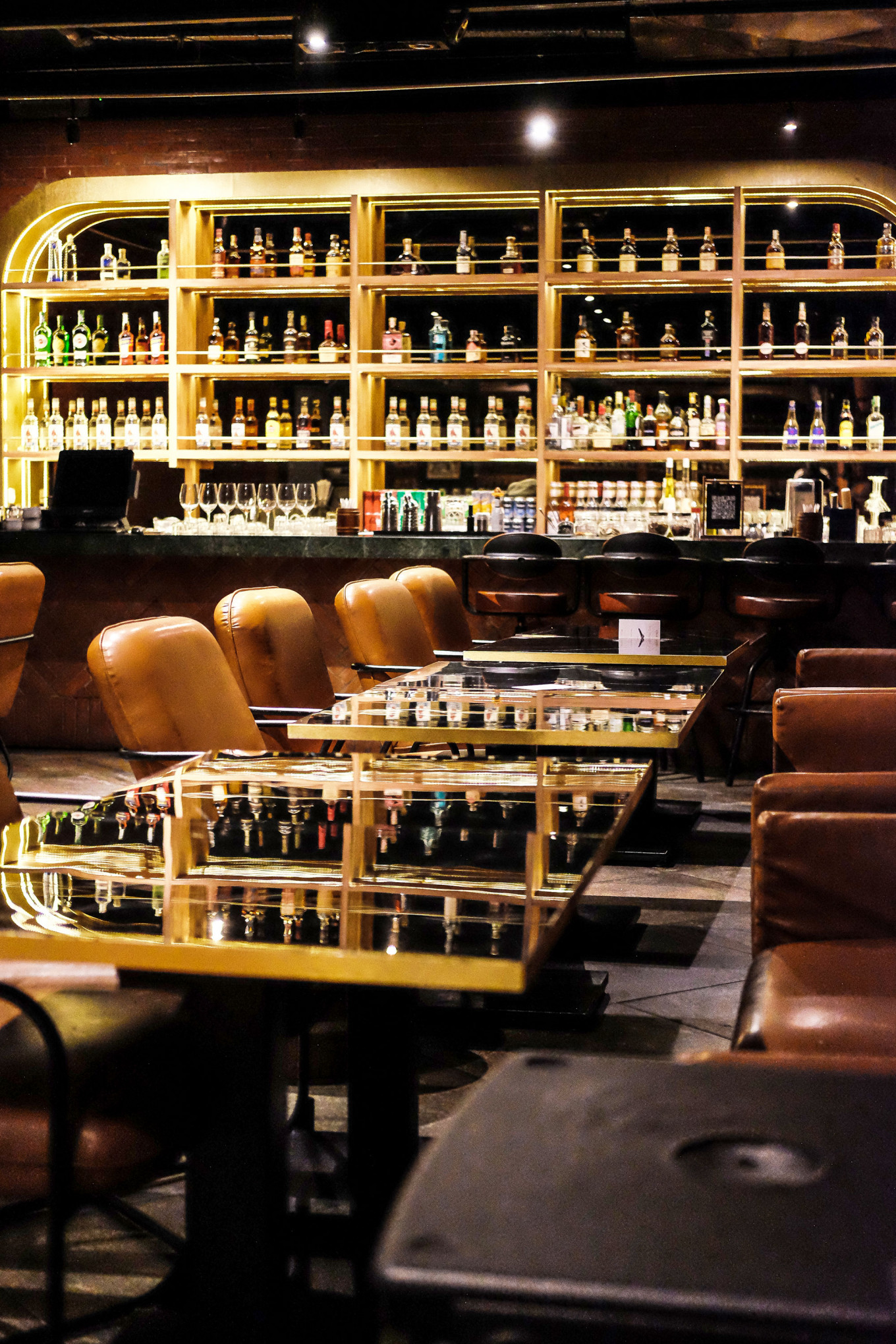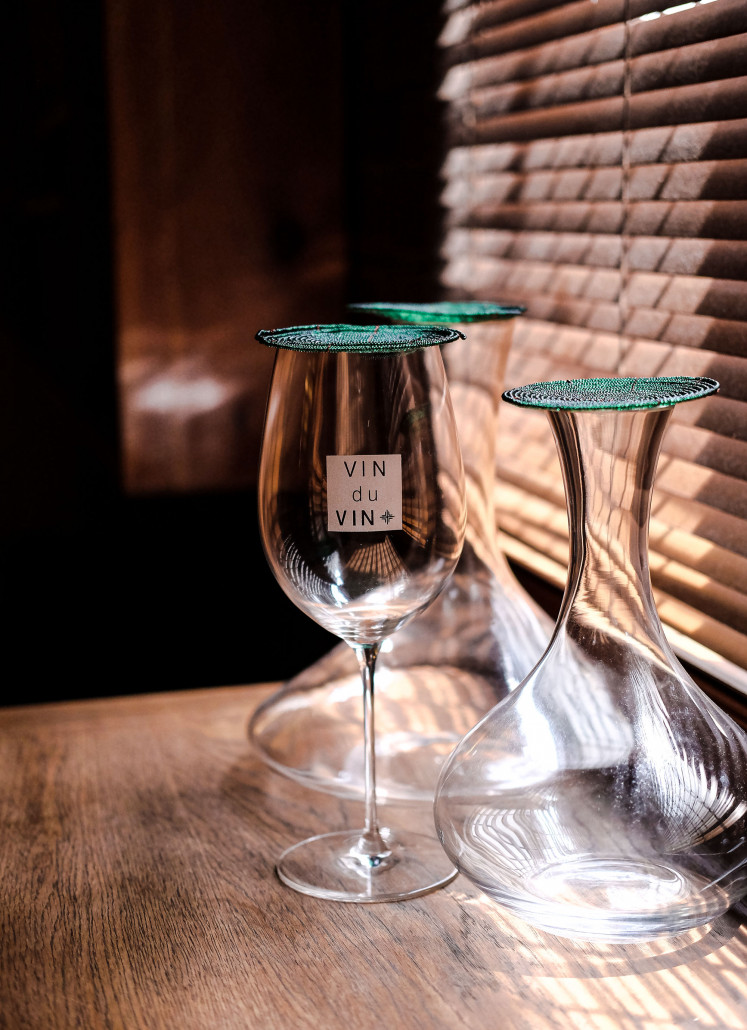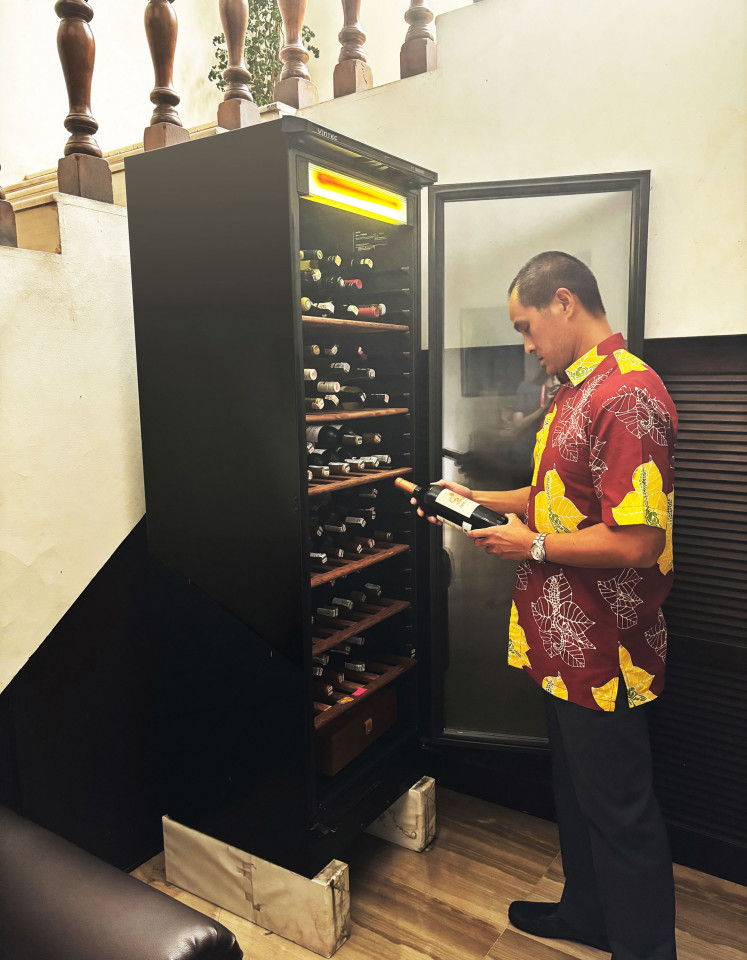



Can't find what you're looking for?
View all search results
“Drinking good wine with good food in good company is one of life’s most civilized pleasures,” declared Michael Broadbent, renowned wine critic, writer and auctioneer. He may not be alone in that kind of thinking, especially if he chooses to find allies in the expansive social circles of Indonesia.
Among the many places to eat in the city of Jakarta, restaurants and wine bars have become a hub for socializing over a glass, or a bottle, of wine. Red, white or rosé, the glasses are never empty and the conversations appear never-ending at every table, booth and counter.
In most restaurants, the extensive wine list may seem daunting for diners, with words that seem unpronounceable from different exotic places around the globe. But worry not, wine sommeliers are eager to help pick a bottle catering to each palate. With the growing number of wine enthusiasts in Jakarta, they are never idle.
Despite being a predominantly Muslim country, Indonesians are not prudish about alcohol and spirits, with the production of arak and tuak going back centuries. According to data published by Statistics Indonesia (BPS) in 2022, per capita alcohol consumption among adults aged 15 and older was recorded at an estimated 0.33 liters.

The wine masters
So let’s say you want to dip your toes into the wine scene, taking all the delicate notes before deciding whether the “Drink of the Gods” is also suitable for a mere mortal like yourself. How do you know what to start with?
Enter the sommelier: a knowledgeable wine professional typically found in a fine-dining establishment dispensing advice to patrons on ideal wine and food pairings.
Here, you will want to ask for Wicien Widjaja, president of the Jakarta chapter of the Indonesia Sommelier Association, notable for being the first and only sommelier in Indonesia with certification from Court Master Sommelier.
Wicien said his initial interest was piqued when he studied in Australia, as far back as 2014. “I realized wine wasn’t as simple as it seemed to me. Of course, it all started with tasting delicious wines and discovering the varieties of it!”
To him, wine is more relevant than ever today. “Wine can bring people together for gathering, socializing, or even just for a quick afternoon chat after a busy day at work,” he said. Sophisticated as it sounds, Wicien agrees that wine is more than anything a lifestyle. “Anyone can have wine. My job is to help people find one, or some, they’ll enjoy.”
In Indonesian wine-tasting circles, many will have the fortune to bump into Teguh “Alex” Alexander. A self-taught sommelier, he first picked up a textbook during the pandemic in 2020 and hasn't stopped since.
His efforts paid off when he joined several competitions for three years and emerged victorious as a sommelier. As for why he started, “I guess I just love to drink, and wine seemed interesting since not many people were into it. So I gave it a shot.”
In all seriousness, he finds it rare to find a “real sommelier” in Indonesia. He saw the need for more when he realized that not a lot of people here know enough information about wine, and so he stepped up to the plate.
“I’m sorry to say this, but I think the market in Indonesia is not educated enough, so that’s why sommeliers are needed,” he said. “For me, it’s not about whether you are too young or old, it’s the experience. Most likely, if I see a guest come to my restaurant and start ordering or drinking wine, I will offer them options while I explain features about the wine, in the hope of the guests knowing more about what kind of wine they want to have during that occasion,” Alex explained.
How educated can a customer be about wine? Enough to compete with a sommelier with years of experience under their belt? According to Alex, that’s why we need more sommeliers in general.
In fact, Wicien finds helping to suit one’s preferences his favorite part as a sommelier. His words further prove how wine isn’t as intimidating as it seems, after all, a sommelier is there to help you find what you like. Sommeliers like himself are mainly glad to share their joy for wine, within and outside of the wine communities. It’s an honorable title in the hospitality business. “It takes self commitment and perseverance to win and pursue the title,” says Wicien.
Read also: Dear Taylor: Look what you made us do

The wine collectors
While sommeliers are visible and accessible, the chatter regarding wine collectors may be more muffled among the general public.
“There are a lot of wine collectors that I know in Indonesia, it’s just that they do not expose themselves as collectors. You’d be surprised how many [people] like collecting and drinking wines,” revealed Luki Wanandi, president director of Santini Group, and perhaps more importantly, the man behind VIN+.
Owning an estimated 1,000 bottles stored in various places, he is cautious about labeling himself as a collector. He said, “I don’t even know the definition of ‘a collector.’ I don’t call myself a collector; I call myself a wine lover and a wine drinker.”
His stance on wine is quite conventional, referring to it as a beverage meant to be enjoyed with friends and family, utilized as a vessel to start the conversation around the dinner table.
Of course, it depends on the generation. Wine collector Garrett (not his real name) finds that the younger crowd prefers louder environments for socializing, while wine gatherings tend to be more conducive to meaningful conversations and knowledge sharing.
“For younger collectors, the numbers are relatively low, but there's a significant presence among the older demographic. However, it's worth noting that wine enthusiasts in Indonesia often operate discreetly,” he said, clarifying that the youngest collectors he has come across are usually around 30 years old.
Stella Vania, director of W Academy Indonesia, an educational and marketing agency aimed at the Indonesian wine industry, finds that drinkers’ palates usually seek wine as they get older. The reason? The image of sophistication.
“Wine still has the perception of being sophisticated, sometimes intimidating, but I don’t think wine is like that; wine is fun, from one glass you can tell so much about the background, you can know where it comes from, who made it.”
Read also: Deconstructing Nicholas Saputra
As for what creates the perception in the first place, it is probably tied to the fact that most wine collectors who have acquired a vast collection of bottles have also accumulated money over the years. Alex said some of the people in his circle are of a higher financial standing, citing money as an essential factor to start a collection.
“How can you learn something expensive if you don’t have money? To stay in this industry, you need to learn more. And when you learn more, you will need to spend more,” he said.
Factors about collecting, as Garrett suggested, include proper temperature-control measures, highlighting the importance of investing in wine chillers or temperature-controlled storage solutions. Stella refers to it as a commitment, citing the need for space as well.
“Typically, the rare bottles in my collection are sourced from trusted local importers, with whom my friends and I have established relationships. We ensure all taxes and fees are paid for these acquisitions. However, for exceptionally rare and expensive bottles, they are often acquired during business trips or holidays,” Garrett revealed, adding that navigating the higher taxes in Indonesia is an obstacle to growing his collection.
The Indonesian wine enthusiast
With VIN+, Luki is given a strategic insight into the demographic of wine drinkers in Indonesia. According to him, most that flock to his establishment for events and promotions are those that belong to the millennial generation.
A notable aspect in the demography of wine drinkers is economic status, those that use their passports quite often. According to Forbes, Italy is still the top wine-producing country, contributing 19 percent of the global wine market in 2020, followed by France and Spain.
“The middle class is increasing, when they increase, they travel more, so they are more exposed to another culture. One of which is wine,” agreed Stella.
According to Alex, Indonesians are creatures of habit, preferring to stick to the types of wine they’ve known and loved before. However, Wicien offers a different view.
“The younger generation tends to be more open minded,” says Wicien. This curiosity is what could drive younger crowds to care about the history and what wine is made from.
Stella added that the more wine young people drink, the more evolved their palates become. With time, these future collectors will slowly move away from the sweetness of moscato to search for the full-bodied flavors, from cabernet sauvignon and shiraz. Being more familiar with what they like is also half the fun of wine drinking.
Compared with her time working in Singapore, Stella said the growth of the wine scene in Indonesia is much better. Even with the higher tax brackets, the wine scene is still burgeoning, as the seasons change and the new generation takes the wheel in society.
The price and perception of sophistication can be dismissed as white noise for beginners, at least for now. “Wine doesn’t have to be expensive if you know what you like. To be honest, some expensive wines I’ve drunk for whatever reason were not very memorable. Some of the good value wines, on the other hand, were very good,” said Stella.
“For me, wine is simple, the good ones are the ones that you like, even if your friends don’t like it,” she concluded. We like to believe that that statement rings true for early wine explorers.
Read also: Must-see homegrown silver-screen adaptations